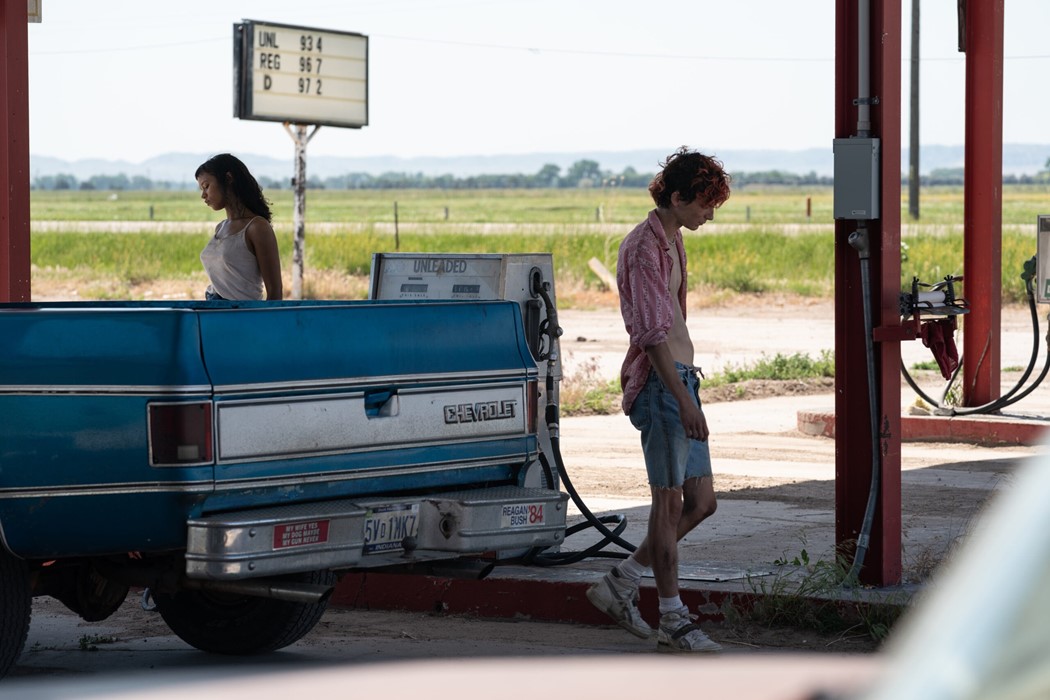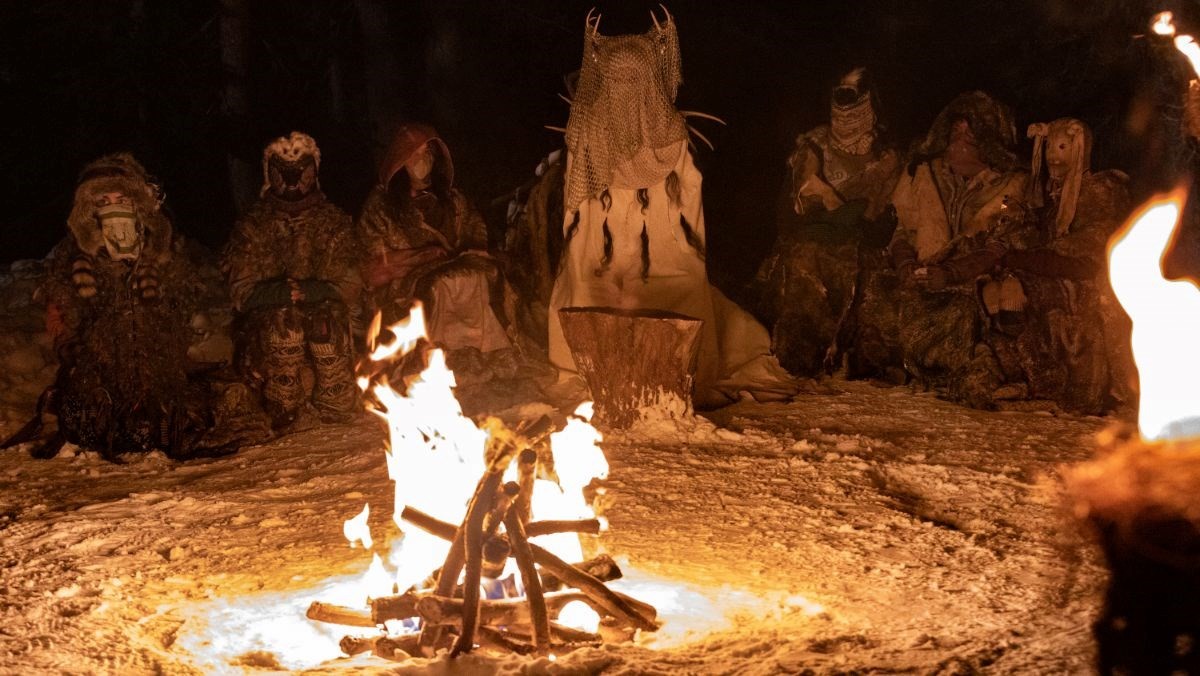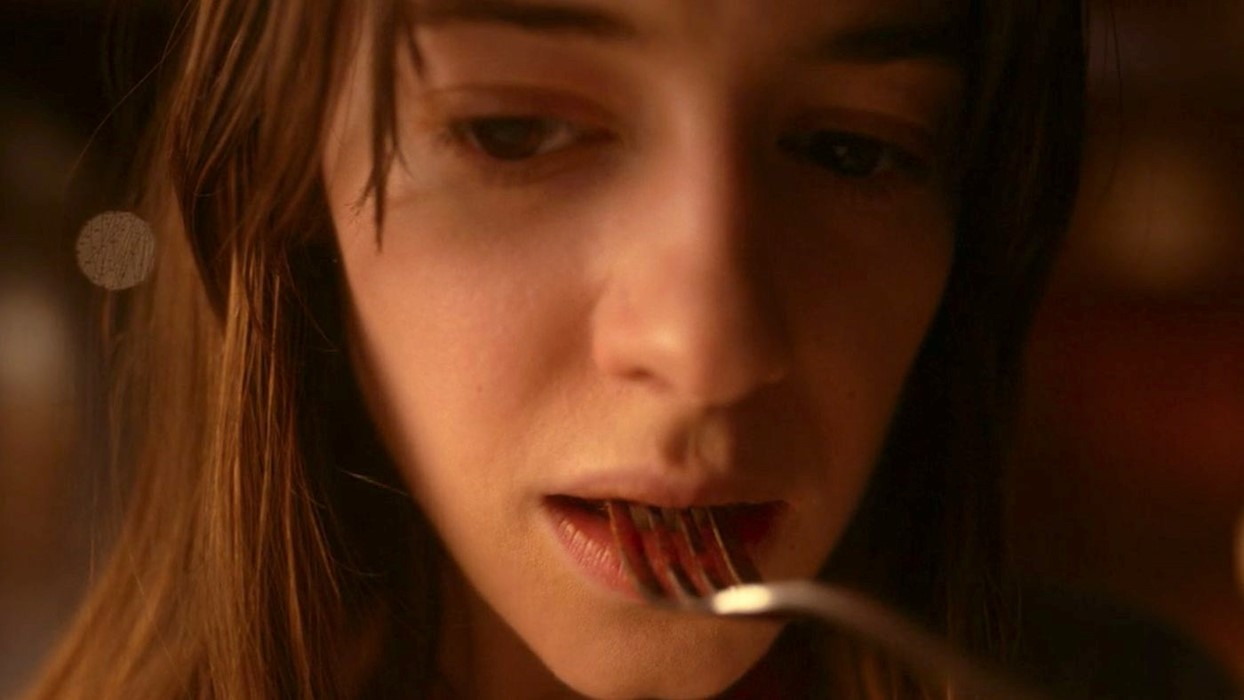As Mimi Cave’s debut feature Fresh is released, Alex Denney delves into the cinematic links between cannibalism and female desire in the horror genre
In Fresh, Daisy Edgar-Jones meets a cannibal in the fruit and veg aisle of the supermarket. She doesn’t know he’s a cannibal, of course (“I don’t eat animals,” he tells her, not entirely truthfully), and one thing leads to another until he takes her on a weekend break in the woods that proves unforgettable for all the wrong reasons.
So it goes in Mimi Cave’s debut feature, a bitingly funny satire on modern dating culture and the spiritual void we’re all trying to fill in our late-capitalist horrorshow. Through the film, we meet Noa (Edgar-Jones), a young woman who’s had it up to here with the guys she meets through her online dating app. So when she encounters Steve (Pam & Tommy’s Sebastian Stan) IRL at the supermarket, the connection feels real. “I’ve met plenty of great people on dating apps, but it’s exhausting,” says Cave of her own experiences in the field. “What it does is it sets up this way of meeting people that is in the same realm of what it feels like to go shopping, and I think that is a dangerous way to assess other individuals. It feels like you’re being packaged up and sold.”
In today’s social media hellscape, it can often feel like we’re eating each other alive for the enrichment of a privileged few. (It’s no surprise that ‘eat the rich’, a phrase attributed to enlightenment philosopher Jean-Jacques Rousseau, is a slogan for our era of income inequality.) Cave, a conflicted social media user, compares the experience to serving up pieces of yourself for public consumption online: “It’s absolutely like that, because you’re showing the best angles, the most exciting parts of your life. It’s curated to a degree that is completely false because you can’t have good things without bad things. The world exists in oppositions, and what’s scary is if younger generations start to believe that this is reality. I think we’re really robbing people of a full experience.”
Cave’s film arrives amid an ongoing resurgence of interest in cannibal-themed stories for the screen, with the smash-hit Yellowjackets and Luca Guadagnino’s upcoming Bones & All lending weight to a sub-genre that also includes Hannibal, Santa Clarita Diet and Julia Ducournau’s Raw. Yellowjackets, a survival drama about a group of teenage girls left stranded in the wilderness after a plane crash, was dreamt up by co-creator Ashley Lyle in response to a tweet about a planned gender-flip remake of Lord of the Flies: “What are they going to do? Collaborate to death?” quipped the poster.
In the show’s first episode, Lyle and co-writer Bart Nickerson tease the idea that the girls will eventually turn to cannibalism during their ordeal, an as-yet unconfirmed possibility that haunts the crash’s survivors throughout their adult lives (the show is told partly through flashback). Like Fresh, Yellowjackets is a story about cannibalism centred on female protagonists. But where Cave’s film pits Noa against the appetites of men, Yellowjackets explores the darkness underpinning female power dynamics and desire. It’s Mean Girls meets Lord of the Flies, with cannibalism serving as a metaphor for the taboo nature of female desire – it’s no coincidence that the sex lives of its characters are a major theme in the show’s present-day segments.

Female characters are the focus of many stories dealing with cannibalism, including Raw, The Neon Demon, Santa Clarita Diet and, lest we forget, The Silence of the Lambs. (Under the Skin is a cannibal film in spirit, if not in actual fact.) Fresh packs in plenty of barbs aimed at toxic masculinity (Noa’s obnoxious first date in the film is called Chad, a sly nod towards incel culture), and Steve, who at first seems legit, is later revealed to be a narcissist with a sense of entitlement every bit as well-developed as Chad. He’s like one of those guys who wears a “This is What a Feminist Looks Like” T-shirt but secretly hates women. “Oh man, I talk to people about that all the time,” says Cave, laughing. “When you meet someone for the first time and they have to tell you they’re a feminist – it’s like, I wasn’t asking! That kind of thing is very strange.”
In Bones & All, the Camille DeAngelis novel upon which Guadagnino’s new film will be based, a young girl goes in search of her father after discovering her shocking appetite for human flesh, consuming a bunch of would-be suitors along the way. Set in Reagan’s America, it’s a book about the loneliness of people judged beyond the pale by the moral majority – but also another story about female desire, and the unwelcome advances of men. In her foreword, DeAngelis reveals another motivation for writing the book: “When people who know I’m vegan hear I’ve written a book about cannibals, they think it’s bizarre, hilarious, or both. The short version is that I believe the world would be a far safer place if we, as individuals and as a society, took a hard, honest look at our practice of flesh eating along with its environmental and spiritual consequences.”
This brings us back to Steve, who doesn’t eat “animals”, and a curious fact about many cannibal stories: they often feature vegetarian and/or vegan characters. In Raw, a veterinary student from a family of vegetarians develops a taste for human flesh after enduring a bizarre orgy of hazing rituals at her new university. And in Yellowjackets, Taissa (Tawny Cypress) becomes a vegetarian after surviving the crash, while the sociopathic Missy (Christina Ricci) has a fondness for beef jerky bought from petrol stations. Fresh, meanwhile, draws parallels between cannibalism and the everyday consumption of flesh with its gratuitous closeups of characters chowing down on their food. Cave is not, herself, a vegetarian, though she steers clear of red meat: “I’ve not eaten it since I was a little girl; I don’t think I could eat it any more without getting sick.” Even so, the thought that there’s something vaguely psychotic about our carnivorous ways lingers throughout Flesh.

“The vegan and cannibal have a point of agreement – either all meat is unethical, or no ethical limits exist, including homo sapiens,” says Desmond Bellamy (aka The Cannibal Guy), who runs a website decoding instances of cannibalism in the news and in popular culture. “Cannibalism’s challenge to meat is simply showing us that we are also edible meat animals.” For Bellamy, meat is a “feminist issue”, because in industrial farming it is mostly female animals reared as reproductive machines before being slaughtered for consumption. It is also, of course, an ecological issue, another fact that might account for our fascination with these stories. “Meat consumption rose 58 per cent between 1998 and 2018, and biologist EO Wilson estimated that for the rest of the world to reach American levels of consumption (with current technology) would require four more planet Earths,” says Bellamy. “No wonder humans, who are made of meat, are wondering where it will all end.”
As we lurch from one disaster to another, it’s easy to feel like humanity’s mask is slipping, Lecter-like, to reveal the monster within. According to Bellamy, cannibals reject an anthropocentric view of the world to put forward a radical new idea – that “all animals are equal, and equally edible”. We’ll raise a nice glass of Chianti to that.
Fresh is now streaming on Disney+
